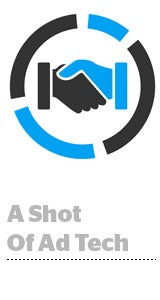 Here’s today’s AdExchanger.com news round-up… Want it by email? Sign-up here.
Here’s today’s AdExchanger.com news round-up… Want it by email? Sign-up here.
AcuityAds Imbibes 140 Proof
AcuityAds snapped up 140 Proof, a 24-person ad tech outfit that collects data from public social profiles, in a $20 million cash deal. 140 Proof’s “blended interest graph” crawls sources like Twitter, Pinterest and Google+. Sign of the times: Acuity CEO Tal Hayek States in his LinkedIn profile that “Acuity is currently seeking to acquire companies in the programmatic / advertising technology space. Please get in touch with me for details.” Press release.
Digital Shopping Bag
Turner will invest $45 million in Refinery29, valuing the company at $500 million, reports The Wall Street Journal. The plan is to create digital and TV programming geared toward millennial women. The two will also sell advertising together. Call it a back-to-school spree: Turner recently invested $15 million in Mashable and $100 million in Bleacher Report, all with the same vision around digital video. “Making an investment like this helps us meet that consumer demand for video outside the traditional television space and really compete effectively across all platforms,” said David Levy, president of Turner. More.
Guard Your Throne
Remember when Yahoo was the king of online search? Justin Choi of TechCrunch explores the possibility of a similar fall from grace for Google. “Google is on the wrong side of major trends in the digital advertising industry,” he argues, citing reliance on direct response as digital ad spend moves up the funnel, dependence on browsers as users move toward apps and feeds, a focus on search when users prefer chance discovery and interruptive advertising in a world of ad blockers. Google has done a good job of beating trends in the past by acquiring (see: YouTube, DoubleClick and Android) and building new technologies. But the company may need a cultural shift to survive the cultural earthquake of today’s digital advertising. More.
Bait-And-Switch
A day after Facebook announced a change to its page-loading protocol to disable ad blockers on its desktop site, open-source coders have purportedly developed a workaround, per a blog post from Adblock Plus. While Facebook ads VP Andrew “Boz” Bosworth knew that counter solutions would emerge, Boz acknowledged they’d slow down the desktop site due to the extra time needed to parse the JavaScript [AdExchanger coverage]. The ad-supply boost Facebook gets from forcing certain ads for ad-block users on its desktop site (which accounts for a dwindling 15% of Facebook earnings) is meaningless. Instead, Facebook gets to mess with the ad blocker community’s moral high ground by forcing them to deliberately undercut user experience.
Welcome To The Auction
Pinterest is introducing auction-style bidding with frequency caps for CPM campaigns. Previously, Pinterest only allowed fix-price CPMs. The new model will make it easier to buy Pinterest alongside other inventory sources. “These changes make Pinterest easier to include in current media plans as an extension of the existing strategy rather than having to create a ‘Pinterest only’ buying mode,” says Ben Clarke, president at digital agency The Shipyard, to Ad Age’s George Slefo. Pinterest’s success driving performance metrics (sales, leads, purchase decisions) may help on the exchange. More.
The Blue Swan
Will Twitter’s Prince Charming ever arrive on his white steed? LinkedIn was neither growing nor profitable, and Microsoft snapped it up for $26.2 billion, 33 times its yearly operating profit. But a Twitter takeover wouldn’t be easy. Recode’s Kurt Wagner reports on some of the structural impediments to a Twitter buy, including split co-founders and a board with relatively little stake that disagrees with investors (who have a high $take). “Bringing the company private, or hiding it behind some other acquirer, certainly looks appealing to those who believe Twitter just needs time.” More.
But Wait, There’s More!
- Microsoft Acquires Beam Interactive Game Streaming – TechCrunch
- Easy Solutions Launches Predictive Risk Technology – release
- Programmatic Keeps Up Momentum in Q2 – PerformanceIN
- MaxPoint Partners With LiveRamp, Integrates With Adobe DMP – release
- CW Replaces Hulu With Netflix As Streaming Partner – Adweek
- AWS Launches USage Plans For API Gateway Service – VentureBeat
- Bynder Raises $22.3M In Series A Funding – release
- IAB Updates Its Attribution Primer – IAB
- AT&T Adworks Launches 60-Second Addressable TV Format – release
- SourceKnowledge Launches A Cloud-Based SaaS Platform – release
- How Programmatic TV Is Impacting Digital Campaigns – The Drum
You’re Hired!
- Emma Winchurch-Beale Is International Sales Director Of WaPo – The Washington Post
- Meredith Names Tom Harty COO – Business Journal
- Kargo Appoints Lizzie Black VP Strategic Partnerships – release
- Arianna Huffington Leaves The Huffington Post – The Huffington Post
- Tapad Adds Two Senior Data Scientists To Boost Analytics – release
- Ex-Google Exec Vincent Rinaldi To Run Programmatic At iProspect – MediaPost










